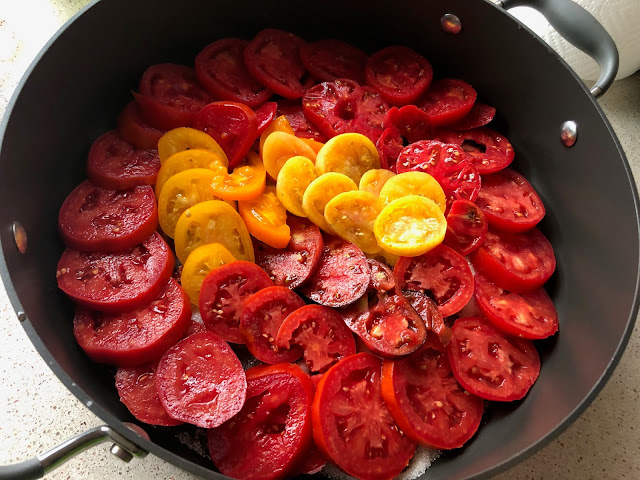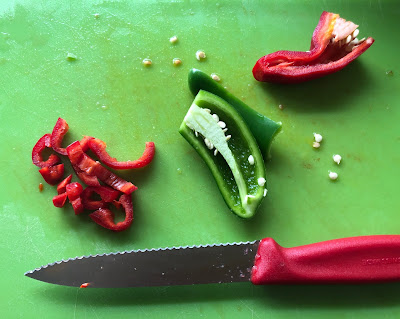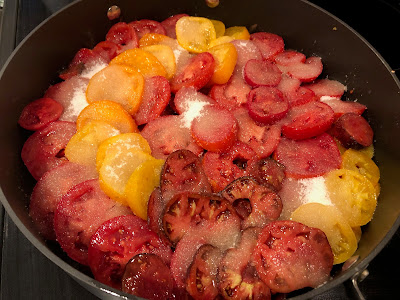
Recipe: Turn a late-summer harvest into a sweet, spicy condiment
 |
| Put the first layer of tomatoes on top of sugar in the pan. (Photos: Kathy Morrison) |
I'm still getting tomatoes. They're not pretty, but they are full of flavor. I wanted to make a spicy tomato jam that would be a burst of summer months from now, when homegrown tomatoes are a memory. But jam requires, oh geez, a lot of stirring!
The answer: Use the oven to cook the jam. I don't know why I didn't long ago discover this technique, which I found on the Food52.com website. I've been canning and freezing tomatoes for at least 10 years, and have also made fruit jam at various times. But now that I've done this, better believe I'm going to use it a lot more. Not having to worry about scorching the jam in a stovetop pot is a relief.
I chose to go tangy-spicy with this recipe, but you can change up the spices to suit your taste. I envision using the jam over roasted chicken thighs, stirred into sour cream for dip or spread on toasted sourdough. My spice selection is listed first in the ingredients; the alternatives are from the original recipe.
Just be sure to use good tomatoes. They don't have to be perfect-looking, but should be fully ripe. I didn't peel them; next time I would peel about half of them, to reduce the skins in the final product. The seeds do add to the texture but squeeze them out if you wish before you thinly slice the tomatoes.
Note: This recipe is not designed to be canned. Use the jam fresh or freeze it for later.
 |
| Peppers are optional but I had some, so why not? |
Oven-roasted sweet 'n' spicy tomato freezer jam
Makes about 3 cups
Ingredients:
2 cups granulated sugar, divided
3 pounds ripe tomatoes, any variety of red or a mix of red and yellow, cored and sliced 1/4-inch thick
Generous pinch of salt
Grated zest of 1 lemon
1/4 teaspoon cinnamon, or 1 cinnamon stick
1/2 teaspoon cumin seeds or fennel seeds, lightly crushed
2 small peppers, hot or mild, halved, seeded and sliced (optional)
1/4 teaspoon red pepper flakes, or 2 dried chilies
Instructions:
Pour 2/3 cup of the sugar over the bottom of a large braising pan or other large oven-safe baking dish. Layer in half the tomato slices, overlapping slightly. Sprinkle the slices with the salt, 1/3 cup sugar, the lemon zest, cinnamon or cinnamon stick, cumin or fennel seeds, the peppers (if using) and red pepper flakes or chilies.
Layer the rest of the tomato slices over the spices, followed by the remaining 1 cup sugar. Allow the tomatoes to macerate for 30 minutes. While they're sitting, preheat the oven to 400 degrees.
Place the uncovered pan in the oven, checking every 20 minutes or so, stirring and spooning the juices over the top tomatoes. The tomato juices should be simmering by the end of 1 hour. (Remove the chilies if they char.)

The tomatoes are topped with the last of the sugar before
going in the oven.
|
Continue roasting and stirring every 20 minutes. The jam should start to gel after about 2 hours, but it depends on how juicy your tomatoes are. To check, use the classic plate test: Onto a cool or chilled plate, spoon a little jam. Let it cool for a minute, then run your finger through it, drawing a line. If it "holds" and doesn't spread back to fill in the line, the jam is ready.
Remove the jam from the oven and let it cool. (Remove the cinnamon stick if used.) Spoon it into freezer jars or refrigerator containers, depending on how you wish to store it.
Comments
0 comments have been posted.Sacramento Digs Gardening to your inbox.
Food in My Back Yard Series
May 6: Maintain soil moisture with mulch for garden success
April 29: What's (already) wrong with my tomato plants?
April 22: Should you stock up on fertilizer? (Yes!)
April 15: Grow culinary herbs in containers
April 8: When to plant summer vegetables
April 1: Don't be fooled by these garden myths
March 25: Fertilizer tips: How to 'feed' your vegetables for healthy growth
March 18: Time to give vegetable seedlings some more space
March 11: Ways to win the fight against weeds
March 4: Potatoes from the garden
Feb. 25: Plant a fruit tree now -- for later
Feb. 18: How to squeeze more food into less space
Feb. 11: When to plant? Consider staggering your transplants
Feb. 4: Starting in seed starting
Sites We Like
Garden Checklist for week of May 11
Make the most of the lower temperatures early in the week. We’ll be back in the 80s by Thursday.
* Plant, plant, plant! It’s prime planting season in the Sacramento area. Time to set out those tomato transplants along with peppers and eggplants. Pinch off any flowers on new transplants to make them concentrate on establishing roots instead of setting premature fruit.
* Direct-seed melons, cucumbers, summer squash, corn, radishes, pumpkins and annual herbs such as basil.
* Harvest cabbage, lettuce, peas and green onions.
* In the flower garden, direct-seed sunflowers, cosmos, salvia, zinnias, marigolds, celosia and asters. (You also can transplant seedlings for many of the same flowers.)
* Plant dahlia tubers.
* Transplant petunias, marigolds and perennial flowers such as astilbe, columbine, coneflowers, coreopsis, dahlias, rudbeckia and verbena.
* Keep an eye out for slugs, snails, earwigs and aphids that want to dine on tender new growth.
* Feed summer bloomers with a balanced fertilizer.
* For continued bloom, cut off spent flowers on roses as well as other flowering plants.
* Add mulch to the garden to maintain moisture. Mulch also cuts down on weeds. But don’t let it mound around the stems or trunks of trees or shrubs. Leave about a 6-inch-to-1-foot circle to avoid crown rot or other problems.
* Remember to weed! Pull those nasties before they set seed.
* Water early in the day and keep seedlings evenly moist.